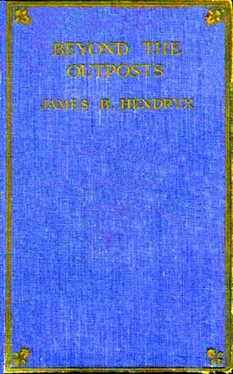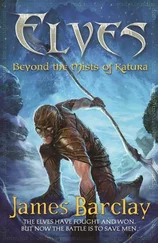Hastily she dressed, and stepping from the door of her tent, surveyed her surroundings. Close at hand, near the dead ashes of last night’s fire, was a pile of duffle that she recognized as the cargoes of the two canoes. On top of this pile were Teddy Bye and Bye’s blankets. The blankets of the other three Indians were not in evidence. The canoes themselves were lying bottom side up close beside the duffle. No one was in sight.
Raising her voice, the girl called Teddy Bye and Bye, and receiving no answer, she called again and again. Finally she gave it up and built a fire from the little pile of dry kindlings and wood prepared the evening before by Teddy Bye and Bye. She brewed some tea and broiled a piece of caribou. As she ate her solitary breakfast, she tried to reason the disappearance of the Indians. The first thought that crossed her mind was that they had sighted caribou and had gone in pursuit of them. But, no, the two rifles, the 30-40 and the 22 were in their cases on top of the pile of duffle, close beside Teddy Bye and Bye’s blankets. But where were the blankets of the other Indians? And why were the canoes and the duffle hauled up from the beach and piled close to the tent? Why, also, had Teddy Bye and Bye, slept on the top of the pile instead of on the ground as was his wont?
Suddenly, a solution occurred to her. The stuff had been carried from the beach after she had retired because the Indians feared that Nixon and his Eskimo might steal them. Perhaps they had tried it, and the Indians had gone in pursuit. But, in that case, why had they not taken the guns, at least the heavy rifle? For Nixon was armed, he had carried a rifle, and she had noted a bulge in the front of his shirt that could only have been made by a revolver of large calibre. Perhaps they had gone to explore the river, but one of them could have done that as well as four, leaving the others free to prepare breakfast and break camp.
A slight sound from the direction of the scrub attracted her attention, and she looked up quickly to see Teddy Bye and Bye approaching from the direction of the Kendall.
“Where in the world have you been?” asked the girl, with a trace of annoyance in her tone, “and where are the rest of them? Here it is after seven o’clock and we should right now be on the river.”
The Indian, his face impassive as a mask, rilled his tin cup with tea from the pot, and reached for a chunk of the broiled meat. Then he gravely pointed toward the direction from which he had just come. “Gone,” he grunted, and holding the meat in his fingers, bit off a mouthful.
“Gone!” cried the girl, “who’s gone? And where?”
“Injun gone. Back to Mackenzie. Me, I’m try for ketch, but dey got too mooch good, w’at you call, de start.”
“Gone back to the Mackenzie? What for?”
“Dem ’fraid de Innuit—de Eskimo. Dem ain’ see no Innuit befor’—an’ dem hear de w’ite man talk ’bout Innuit kill um Injun, an’ dem gon’.”
“Nonsense!” cried the girl, angrily. “He was lying! He just wanted a job, and when he found out I wouldn’t give him one he tried to scare me. But it didn’t work. No one but a fool would believe him.”
The Indian shrugged: “Dem Injun know ’bout dem two pries’ git kill. Dem t’ink, mebbe-so, dem git kill, too.”
“You don’t mean to sit there and tell me the Eskimos really did murder two priests! It’s preposterous! They’re a peaceable and friendly people. They wouldn’t hurt anybody. This man, Nixon, or whatever he calls himself, made it up out of whole cloth. He was lying. I don’t believe a word of it.”
Teddy Bye and Bye shook his head: “De Innuit kill de pries’, all right. De Mounted, Inspector La Nauze, an’ Corporal Bruce dem hont roun’ oop on de coas’ fer mos’ two year, an’ dey ketch um two Innuit, w’at kill de pries’, an’ bring um back for put in de jail—mebbe-so de w’ite mans hang dem oop wit’ de rope.”
Irma Boyne eyed the Indian narrowly; “Are you telling me the truth?” she asked, sharply, “are you sure of that?”
Teddy Bye and Bye nodded emphatically: “Oui, I’m see um Innuit w’en dey bring up back. Dat de trut’—everybody know ’bout dat. Nixon, him know de Injun know ’bout de pries’. Dat w’y he tell ’bout de Innuit so mooch. He ain’ try for scare you, he try for scare de Injun, so we ron away back to Mackenzie. Den, w’en you all ’lone, you got for hire him for de guide.”
“The dog!” cried the girl, angrily. “The sneaking cur! So, that’s what his game was? Well, he better not show up around this camp again! I’ll tell him to his face just exactly what I think of him. I’d go alone before I’d hire him!”
“He’s face ain’ care w’at you tell um ’bout. Him bad mans. Gon for mak’ de trouble for us, bye um bye. Dat better we shoot um nex’ tam we see um, an’ he ain’ kin mak’ no trouble no mor’.”
“Shoot him!” cried the girl in horror. “No, no, no, we can’t do that! Can’t murder him! Only in self-defence can we shoot—and I don’t think it will ever come to that. He’s too much of a coward, you can see it in his face.”
The Indian shrugged, and made no reply.
“Anyway,” said the girl, brightening up, “you’re not afraid, and neither am I. Not afraid of the Eskimos, nor of Nixon. We can push on up the river, can’t we. Tell me, why weren’t you afraid, like the others?”
“Me, I’m scairt joos’ so mooch lak’ dem. I’m t’ink dem Innuit gon’ kill us, mebbe-so, lak’ de pries’. But, Teddy Bye and Bye, she good man. She say she go long till you fin’ de pere. Voila! I’m go’ ’long. I’m ain’ ron away. Eef I’m ron ’way I’m ain’ no good man no mor’. De factor—an’ de Mounted an’ de odder mans on de reever, dem say, ‘To hell wit’ um. Him ron ’way. Him, w’at you call—de queeter!’ Den I’m ain’ git no good job no mor’—me.”
The girl rose to her feet: “You are a good man, Teddy Bye and Bye!” she exclaimed, “and you may be sure you won’t lose anything by standing by me. And back on the river they’ll know all about it—the Mounted and the factors. I’ll tell them all how you stayed when the others ran away. But the Eskimos won’t kill us. If we have any further trouble on this trip, it will be from that man, Nixon, and not from any Eskimos. But, why did you bring the canoes and all the supplies up here by the tent? Did you think Nixon would try to steal them?”
“Non, I’m ain’ t’ink Nixon steal um. I’m know dem Injuns gon’ for ron ’way. Dem mission Injuns no good. Dem too mooch scairt. I’m take de canoe an’ de grub oop here, I’m t’ink, mebbe-so, dem ain’ try to ron ’way. I’m t’ink dey mor’ scairt for hongre den scairt for Innuit.”
“But, can they find their way back to the Mackenzie on foot?” cried the girl. “And what will they eat?”
Teddy Bye and Bye shrugged a shrug of unconcern. “Plent’ long trail. Plent’ muskeg. Plent’ beeg swamp. Mebbe-so dem eat berries, kill de young goose, an’ de duck wit’ de stone. Kill de feesh on de rapids wit’ de stick. Mebbe-so nex’ tam dem ain’ ron ’way.”
Almost the entire morning was spent in going over the supplies and making a one-canoe outfit from the cargoes of both. When at last they were ready for the trail, the girl contemplated the discarded duffle and the extra canoe. “What are we going to do with this stuff?” she asked.
For answer the Indian led the way into the scant timber, and set to work with the axe in the building of a small log cache. When it was completed, and the top logs weighted with heavier logs and stones, he constructed a pair of low log trestles nearby upon which he carefully placed the canoe, bottom side up.
“Why didn’t you turn the canoe upside down on top of the cache?” asked the girl.
Читать дальше












